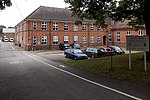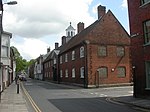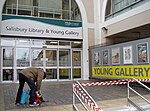St Francis's Church, Salisbury
20th-century Church of England church buildingsChurch of England church buildings in WiltshireChurches completed in 1940Churches in SalisburyGrade II listed churches in Wiltshire

St Francis Church, Salisbury is an evangelical, charismatic, Church of England parish church in the northern suburbs of Salisbury, Wiltshire, England, consecrated in 1940.
Excerpt from the Wikipedia article St Francis's Church, Salisbury (License: CC BY-SA 3.0, Authors, Images).St Francis's Church, Salisbury
Beatrice Road, Salisbury Bishopdown
Geographical coordinates (GPS) Address External links Nearby Places Show on map
Geographical coordinates (GPS)
| Latitude | Longitude |
|---|---|
| N 51.0831 ° | E -1.7965 ° |
Address
St Francis Church
Beatrice Road
SP1 3PN Salisbury, Bishopdown
England, United Kingdom
Open on Google Maps









